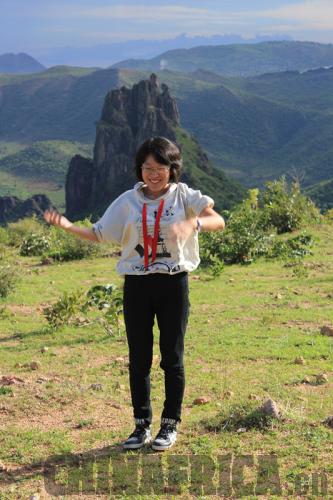| 
» Liu Jingfang, a student at Beijing International Studies University, is interested in African food. In 2012, as a volunteer, she traveled to Douala, the largest city in Cameroon. There, along with eight other Chinese college students, she started a project called A Bite of Cameroon. Despite not knowing each other, everyone in the group was drawn together by a shared interest in African food. Liu Jingfang spoke to ChinAfrica about her unique experience.
What inspired you to go to Cameroon to learn about African food?
I once saw a Taiwanese TV program filmed in a food market in Yaounde, and this aroused my curiosity about the food in Cameroon. Meanwhile, A Bite of China, a documentary about Chinese food culture, was a hit in China. Since then I had been considering filming my own project, "A Bite of Cameroon," to promote African food to Chinese audiences.
Besides, I wanted to go to an African country to better understand the African continent. In addition, I am a football fan. Cameroon's football team is called "The Indomitable Lions." So I chose Cameroon.
Compared with Chinese food culture, what's special about African food culture?
The food culture in Africa is totally different from that in China. In Cameroon, people like to eat with their hands instead of with utensils. But in most restaurants, they have Western utensils due to France's influence. As I observed, local people are accustomed to using utensils except when eating traditional or street food.
It was very interesting to find that geckos and peacocks will accompany you when you eat in Cameroon. When eating in a home or at a restaurant, peacocks amble around or there are geckos running on the walls. If you realize that they are just walking around rather than looking for food, you will feel at ease around them. In Cameroon, people feel that they should allow animals to share in people's happiness during a meal. They are so used to this that they will lose their appetites if they are not accompanied by geckos or other animals.
What interesting things happened to you and your fellow volunteers during the project?
Once we helped out at a farm to feed ourselves. We used raw materials that we had picked in the field and made a fire to cook. Although we are not good at cooking, with the help of a local grandma we finally made some food. On our way back, each one of us would carry one kind of food or tool. The grandma taught us to carry heavy bags on our heads like the Cameroonians do. But we couldn't do it, and the bags always fell down. One Czech boy could do it, though, and he carried a bag this way for almost two hours. This made us all laugh.
What else are you doing now with respect to Cameroon?
I have kept in touch with some local student leaders. They have established a green tourism agency called Oil Tourism to help students from around the world experience Cameroonian culture. I'm now trying to organize a group to start a project. As part of the project, we'll promote online sales to support Cameroonian tourism. At the same time we will act as a platform to help Chinese students realize their African dreams. Things are a bit hard now, but I'm hopeful. I hope that more Chinese people will know and really understand Cameroon in the future.
Can you recommend some special foods to our readers?
There is a type of grilled fish that can be found on almost every street in Cameroon. Covered with onions, the meat is tender and the skin is crisp. Dip a piece of fish in salty or spicy sauce, or Bobolo (a local sour sauce fermented from a kind of cassava) and you'll find the inside fish is juicy. It tastes delicious with these sauces.
Even if you are not daring, taste the grilled worms. Be brave enough to taste them, no matter how disgusting they look. They actually taste really good and won't disappoint you. |